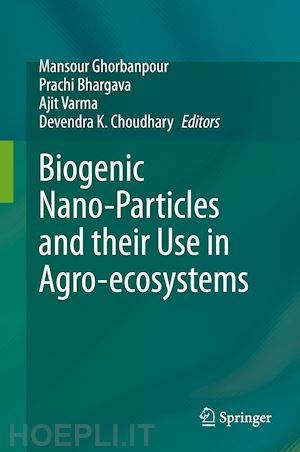
Questo prodotto usufruisce delle SPEDIZIONI GRATIS
selezionando l'opzione Corriere Veloce in fase di ordine.
Pagabile anche con Carta della cultura giovani e del merito, 18App Bonus Cultura e Carta del Docente
Several nano-scale devices have emerged that are capable of analysing plant diseases, nutrient deficiencies and any other ailments that may affect food security in agro-ecosystems. It has been envisioned that smart delivery systems can be developed and utilised for better management of agricultural ecosystems. These systems could exhibit beneficial, multi-functional characteristics, which could be used to assess and also control habitat-imposed stresses to crops.
Nanoparticle-mediated smart delivery systems can control the delivery of nutrients or bioactive and/or pesticide molecules in plants. It has been suggested that nano-particles in plants might help determine their nutrient status and could also be used as cures in agro-ecosystems. Further, to enhance soil and crop productivity, nanotechnology has been used to create and deliver nano fertilizers, which can be defined as nano-particles that directly help supply nutrients for plant growth and soil productivity.
Nano-particles can be absorbed onto clay networks, leading to improved soil health and more efficient nutrient use by crops. Additionally, fertilizer particles can be coated with nano-particles that facilitate slow and steady release of nutrients, reducing loss of nutrients and enhancing their efficiency in agri-crops.
Although the use of nanotechnology in agro-ecosystems is still in its early stages and needs to be developed further, nano-particle-mediated delivery systems are promising solutions for the successful management of agri-ecosystems. In this context, the book offers insights into nanotechnology in agro-ecosystems with reference to biogenic nanoparticles. It highlights the:
• occurrence and diversity of Biogenic Nanoparticles
• mechanistic approach involved in the synthesis of biogenic nanoparticles
• synthesis of nanoparticles using photo-activation, and their fate in the soil ecosystem
• potential applicationsof nanoparticles in agricultural systems
• application and biogenic synthesis of gold nanoparticles and their characterization
• impact of biogenic nanoparticles on biotic stress to plants
• mechanistic approaches involved in the antimicrobial effects and cytotoxicity of biogenic nanoparticles
• role of biogenic nanoparticles in plant diseases management
• relevance of biological synthesized nanoparticles in the longevity of agricultural crops
• design and synthesis of nano-biosensors for monitoring pollutants in water, soil and plant systems
• applications of nanotechnology in agriculture with special refer to soil, water and plant sciences
A useful resource for postgraduate and research students in the field of plant and agricultural sciences, it is also of interest to researchers working in nano and biotechnology.
Dr. Ghorbanpour is a scientific member at the Department of Medicinal Plants, Faculty of Agriculture and Natural Resources, Arak University, Arak, IRAN. Also, scientific member at Institute of Nanoscience and Nanotechnology, Arak University, Arak, Iran. Presently, Dr. Ghorbanpou is an Associate Professor at the Department of Medicinal Plants, Faculty of Agriculture and Natural Resources, Arak University, Iran. Dr. Ghorbanpour maintains a worldwide network, and has published over 120 journal articles and 7 books. He is an editor of various international journals.
Dr. Bhargava has over 16 years of teaching and research experience in microbial molecular biology and is currently working as an Associate Professor at Shri Ramswaroop Memorial University, Lucknow. She has worked as Principle Investigator on various major GOI-sponsored projects, and was recently involved in a project sponsored by SERB, New Delhi. As an active researcher,Dr Bhargava has published numerous research and review articles in respected journals, along with several book chapters.
Prof. Dr. Varma is The Group Deputy Vice Chancellor of Amity University and Head of Amity Institute of Microbial Technology. He spent almost three decades as a Senior Professor at JNU, New Delhi (1985-2004). He has published over 300 research articles for respected national and international journals, as well as several major review articles and chapters in books. He has published more than 120 books in the area of microbial technology and has been the series editor for Springer-Verlag’s Series on Soil Biology. He has extesive experience of organizing national and international training workshops/symposia and congresses.
Dr. Choudhary is a member of the National Academy of Sciences (MNASc), India. He holds a PhD in Microbiology and is currently working as an Associate Professor at Amity University, Noida. Dr. Choudhary has worked as Principle Investigator on major GOI-sponsored projects. He has published over 87 research articles for respected national and international journals, as well as several major review articles and chapters in books. He has also edited more than 10 books sponsored by SpringerNature.











Il sito utilizza cookie ed altri strumenti di tracciamento che raccolgono informazioni dal dispositivo dell’utente. Oltre ai cookie tecnici ed analitici aggregati, strettamente necessari per il funzionamento di questo sito web, previo consenso dell’utente possono essere installati cookie di profilazione e marketing e cookie dei social media. Cliccando su “Accetto tutti i cookie” saranno attivate tutte le categorie di cookie. Per accettare solo deterninate categorie di cookie, cliccare invece su “Impostazioni cookie”. Chiudendo il banner o continuando a navigare saranno installati solo cookie tecnici. Per maggiori dettagli, consultare la Cookie Policy.